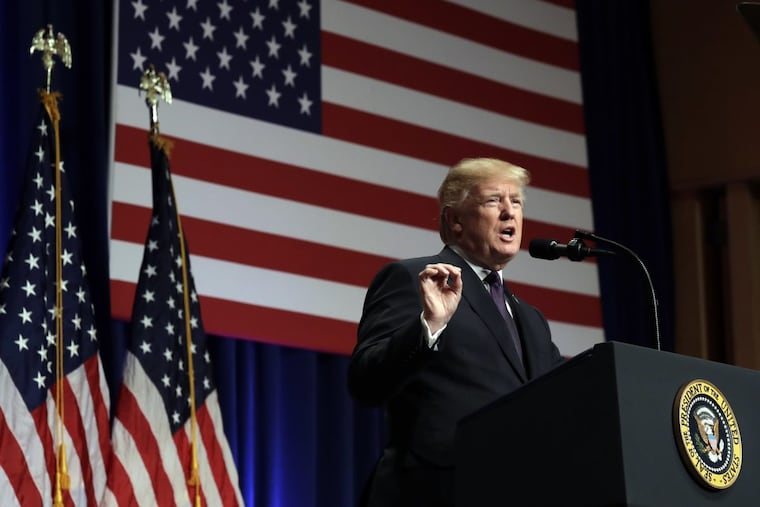Glimmers of hope in Trump's National Security Strategy
The president has arrived at a national security team capable of producing a tempered, resolute and wide-ranging strategy on a tight time frame.

It seems odd that Dean Acheson, one of history's great diplomats, felt a need to explain why he wrote a memoir of his years at the State Department — the masterpiece Present at the Creation, published in 1969.
In those pages, Acheson chronicled a dozen of the most consequential years in world history: the wrecking of civilization in World War II and the building, atop the rubble, of an alliance for liberty that has given humanity its longest period of great-power peace since the Roman Empire.
Acheson wrote, he explained, because the 1960s "have brought the country, and particularly its young people, to a mood of depression, disillusion, and withdrawal." In such a moment, he felt it important to "tell a tale of large conceptions, great achievements, and some failures, the product of enormous will and effort."
We find ourselves in a similar moment, profoundly disillusioned, anxious as well as depressed, apparently eager to withdraw from world leadership into heated discussions of trysting FBI agents and the president's consumption of diet soda.
Yet the world presses in. Even with an economy in tatters (the GDP of Russia is barely half that of France, despite having twice the population), Vladimir Putin rules like a czar while waging a cyberwar on the West, seeding chaos and fomenting division. Worse, Chinese dictator Xi Jinping in October announced plans to tighten his grip on a nation once again leaning toward totalitarianism, and to directly challenge the United States and its allies for global influence.
If you like Big Brother, you're going to love what Xi has planned for China. A fascinating, chilling report in the new issue of Wired magazine shows how rapidly the Chinese economy has moved to mobile-phone payments — and how easily that change is being leveraged into a network to track every movement and activity of the Chinese people. Vast databases are being compiled, containing everything from DNA to college aptitude tests, shopping histories to social circles. Those Chinese who pursue party-approved lives will be rewarded, while free-thinking dissent meets stern punishment. The BBC reports that China will have more than half a billion surveillance cameras installed by 2020, using artificial intelligence to recognize faces.
"We can match every face with an ID card and trace all of your movements back one week in time. We can match your face with your car, match you with your relatives and the people you're in touch with," Yin Jun of Dahua Technology told a BBC reporter. "With enough cameras we can know who you frequently meet."
Without doubt, this all-seeing state will use its data to deepen the repression of its people. Among Xi's first acts upon gaining power in 2013 was a crackdown on non-party civil society. Arrests and denunciations have followed; in July, writer and human rights activist Liu Xiaobo died in custody, becoming the first Nobel Peace Prize recipient since the Nazi era to die a prisoner.
Today, as in the days when Acheson executed the bold decisions of President Harry S. Truman, the world has no good alternative to American leadership. That's why President Trump's inaugural address was so disheartening to many of us. Trump seemed to reject the idea of mutually beneficial alliances and partnerships in support of free people and free markets, and against collectivist tyrannies.
But glimmers of hope showed from the National Security Strategy published by the White House on Monday. Though it's not a perfect document, the strategy takes several strides in the right direction, acknowledging Russia's hostile schemes, identifying the long-term China challenge, and beginning to reconcile Trump's "America first" rhetoric with the imperative to rebuild, renew, and expand Team Liberty around the world.
"Some of the greatest triumphs of American statecraft resulted from helping fragile and developing countries become successful societies," the paper declares in a welcome rejection of the zero-sum Bannonism of the early Trump administration. "These successes, in turn, created profitable markets for American businesses, allies to help achieve favorable regional balances of power, and coalition partners to share burdens and address a variety of problems around the world."
The task of bracing ourselves and our allies for the work ahead is more difficult than it might have been without Trump's impulsiveness and base pandering over the past year. But on the bright side, the president has arrived at a national security team capable of producing a tempered, resolute, and wide-ranging strategy on a tight time frame.
If Trump will rely on it for information and advice — rather than on the whims and cranks that periodically distract his attention like jangling keys — there is time yet to repair the foreign policy damage of the recent past and start in the right direction. The next volume of our history need not be "Present at the Destruction."
David Von Drehle is a Washington Post columnist. @DavidVonDrehle